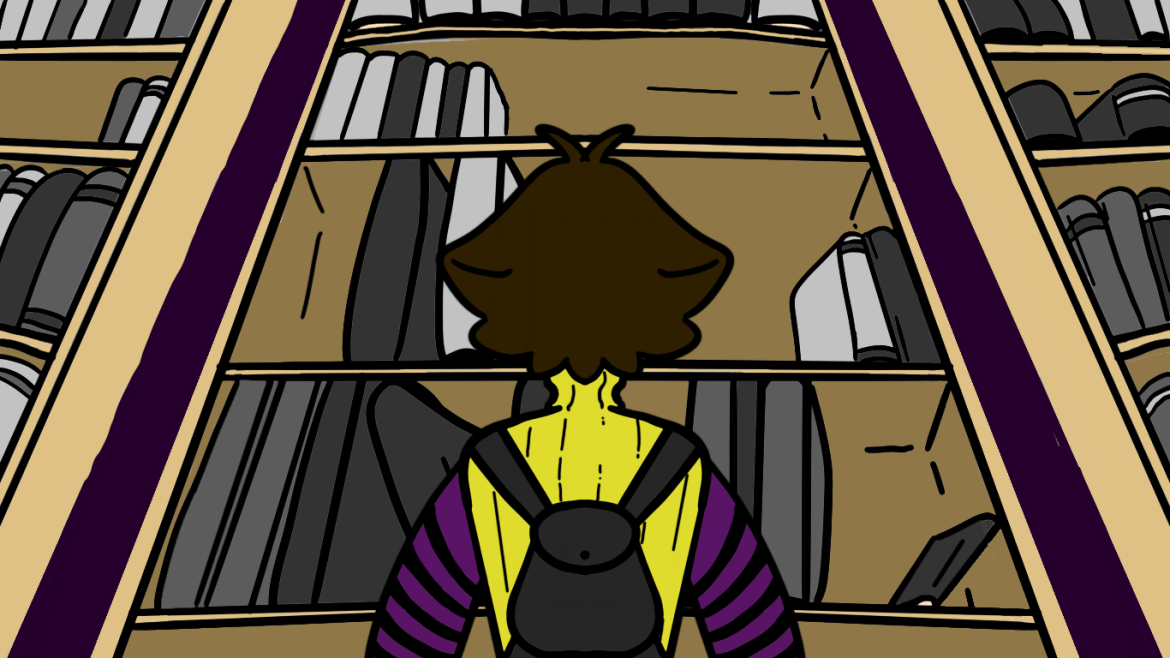A nonbinary student searches a bookshelf, unable to find books that represent their identity. Feelings of underrepresentation have been proven to lead to negative effects on students’ mental health. “School libraries are places where choices are made. And (even if certain) books don’t align with your family values or make a reader uncomfortable, I think every reader deserves the right to be able to choose what they’re reading for themselves,” Media Specialist Angie Pendley said. Illustration by Antonio Starks
The censorship of books with diverse representation in schools can lead to negative consequences in terms of LGBTQ+ students’ mental health.
As a nonbinary student scans the shelves in their school media center, a feeling of self-doubt comes over them when they find only books featuring solely cisgender, heterosexual characters. Books representing their own experiences are nowhere in sight.
Looking back to Banned Books Week, which took place from Sept. 18-24, several books containing diverse characters and plots have recently been banned in U.S. schools. This can cause LGBTQ+ students to feel unseen within school communities.
According to an index conducted by PEN America, over 350 different titles involving LGBTQ+ themes were banned in learning environments from June 2021 to May.
“We all deserve the opportunity to read about people or life experiences that we are not having, because that helps us grow our empathy and it helps us grow our understanding. When (book) choices are made for us, instead of by us, it sends the wrong message to LGBTQ+ kids about who they are, (like that) other people feel like they’re inappropriate.”
— Angie Pendley,
Media Specialist
“If we’re banning books that have LGBTQ+ characters in them, then we’re sending the message that those aren’t the children we’re trying to protect,” Media Specialist Angie Pendley said.
LGBTQ+ students could feel a disconnect between who they are and what they see in books when cisgender, heterosexual characters are made out to be the norm.
“I think it just would feel terrible to a student who was transgender or gay or lesbian to have books banned about those topics because it makes it seem like (being LGBTQ+ is) not okay,” CCHS School Psychologist Dr. Marcia Page said. “That’s just a really negative message (to send to students). It would hurt self-esteem. It can lead to depression and feelings of identity crisis or just feeling rejected.”
An infographic shows various books containing LGBTQ+ content that have been banned at schools this year. Throughout her time at the school, Clarke Central High School Media Specialist Angie Pendley has tried to make the Media Center a safe and welcoming space for all students. “I want kids to feel like this is a place that they can come into and find themselves in books and find their family members in books and find who they want to be when they grow up in books,” Pendley said.“And I hope that data is reflected in not only our collection, but in ourselves and in this space.” Infographic by Maya Shrivastav
With around 9.5% of 13-17-year-olds in the United States identifying as part of the LGBTQ+ community according to the University of California, Los Angeles School of Law Williams Institute, it is important that this group of students is given the opportunity to read about characters and topics to which they can relate.
“When people see representations of themselves in the media, this can foster a great sense of affirmation of their identity,” a 2017 article published on Psychology Today stated. “Feeling affirmed with one’s own sense of self can boost positive feelings of self-worth.”
LGBTQ+ students could feel a disconnect between who they are and what they see in books when cisgender, heterosexual characters are made out to be the norm.
As well as the positive effects that representation can have on mental health, allowing students access to these books can allow students who may not have experiences with the LGBTQ+ community to learn about this group in an accurate way.
“We all deserve the opportunity to read about people or life experiences that we are not having, because that helps us grow our empathy and it helps us grow our understanding,” Pendley said. “When (book) choices are made for us, instead of by us, it sends the wrong message to LGBTQ+ kids about who they are, (like that) other people feel like they’re inappropriate.”
In order to allow students to see both representations of their own experiences and a look into other perspectives, schools should avoid banning books with LGBTQ+ characters, plots and themes.
